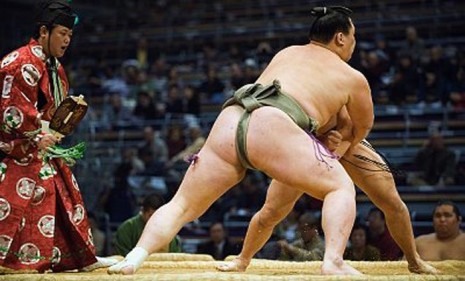The great Japanese sumo wrestling scandal
The ancient sport of sumo wrestling is grappling with an enormous scandal involving gambling wrestlers, Yakuza syndicates, and a crooked hairdresser. Here's all you need to know

A free daily email with the biggest news stories of the day – and the best features from TheWeek.com
You are now subscribed
Your newsletter sign-up was successful
While the rest of the world obsesses about soccer during the World Cup, Japan is reeling from a major scandal involving its own national sport: sumo wrestling. Some of Japan's biggest sumo stars have been accused of participating in an illegal gambling ring. The Japanese Sumo Association is now considering suspending up to 15 wrestlers from the sport, and may take the unprecedented step of canceling an upcoming tournament in Nagoya. (Watch a report about the sumo scandal.) Here's a brief guide to sumo's gambling scandal:
What kind of gambling was taking place?
The wrestlers are being accused of betting on baseball games, which is illegal in Japan. Baseball gambling syndicates are often run by organized crime groups like the Yakuza. This particular ring allegedly has links to gang affiliates.
The Week
Escape your echo chamber. Get the facts behind the news, plus analysis from multiple perspectives.

Sign up for The Week's Free Newsletters
From our morning news briefing to a weekly Good News Newsletter, get the best of The Week delivered directly to your inbox.
From our morning news briefing to a weekly Good News Newsletter, get the best of The Week delivered directly to your inbox.
How many wrestlers are involved?
The Japanese Sumo Association says at least 65 of its 700 members had been involved in illegal gambling. At least 31 members have admitted to betting on baseball. Up to 15 wrestlers and 13 coaches face suspension or expulsion from the sport, including star wrestler Kotomitsuki, ranked second in the world. One trainer, or "stablemaster," allegedly racked up debts of more than $50,000.
How did the gambling ring get set up?
By a hairdresser. The art of preparing the "top knot" — the ceremonial hairstyle adopted by wrestlers — is only practiced by 50 hairdressers in Japan. One, named Tokoike, is suspected of acting as a middleman between wrestlers and illegal bookmakers.
A free daily email with the biggest news stories of the day – and the best features from TheWeek.com
What's the big deal about canceling a tournament?
There are only six tournaments a year, and Japan has not seen a single one canceled since 1946. The money lost in television rights would be a "major blow" to the sport's finances. The Japan Sumo Association says the Nagoya Grand Sumo Tournament will go ahead, but sponsors are already pulling out and national broadcaster NHK may refuse to air the matches.
How significant is this in Japan?
Enormously so. Sumo is one of the oldest regularly practiced sports in the world, with a professional league that dates back to the mid-1700s. Wrestlers are accordingly treated as elite members of society, and are "expected by the fans to live by higher standards and adhere to a rigid set of rules." The popularity of the sport has dwindled with the rise of soccer and baseball, but it is still revered by many Japanese as the national sport.
Are such scandals unheard of in sumo?
No. In fact, sumo's image has been tarred by a number of scandals in recent years. A top Mongolian wrestler quit recently after getting into a drunken bar fight. Two sumo coaches were censured in May for providing seats to a crime syndicate. And in 2007, a 17-year-old apprentice was beaten to death by three other wrestlers during a hazing ritual.
What happens next?
The Japanese Sumo Association will announce the results of an internal probe on July 4, including any suspensions or expulsions, and will make a decision on whether to cancel the July 11 Nagoya tournament.
-
 Gwen John: Strange Beauties – a ‘superb’ retrospective
Gwen John: Strange Beauties – a ‘superb’ retrospectiveThe Week Recommends ‘Daunting’ show at the National Museum Cardiff plunges viewers into the Welsh artist’s ‘spiritual, austere existence’
-
 Should the EU and UK join Trump’s board of peace?
Should the EU and UK join Trump’s board of peace?Today's Big Question After rushing to praise the initiative European leaders are now alarmed
-
 Antonia Romeo and Whitehall’s women problem
Antonia Romeo and Whitehall’s women problemThe Explainer Before her appointment as cabinet secretary, commentators said hostile briefings and vetting concerns were evidence of ‘sexist, misogynistic culture’ in No. 10